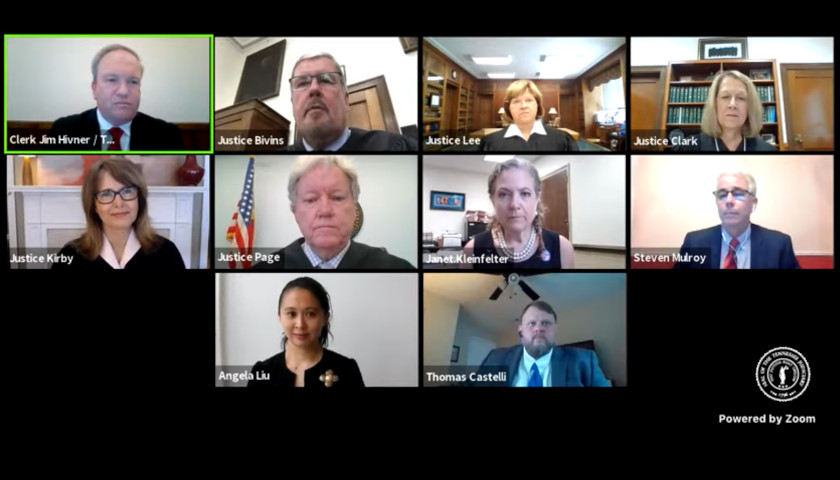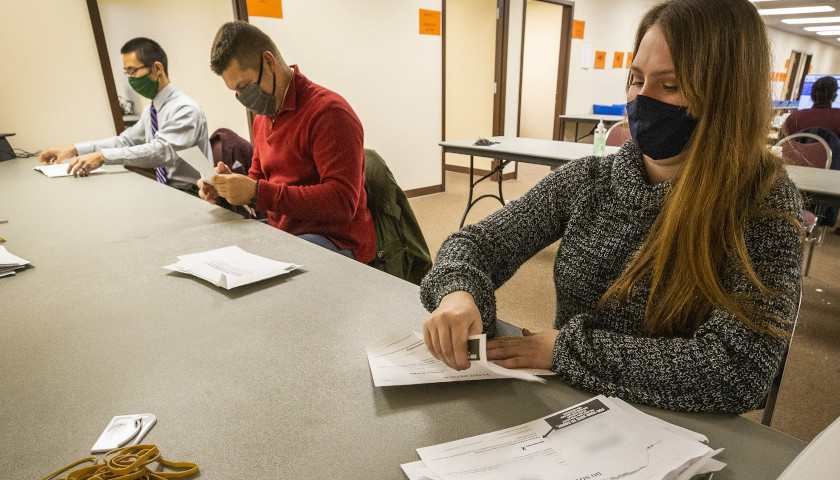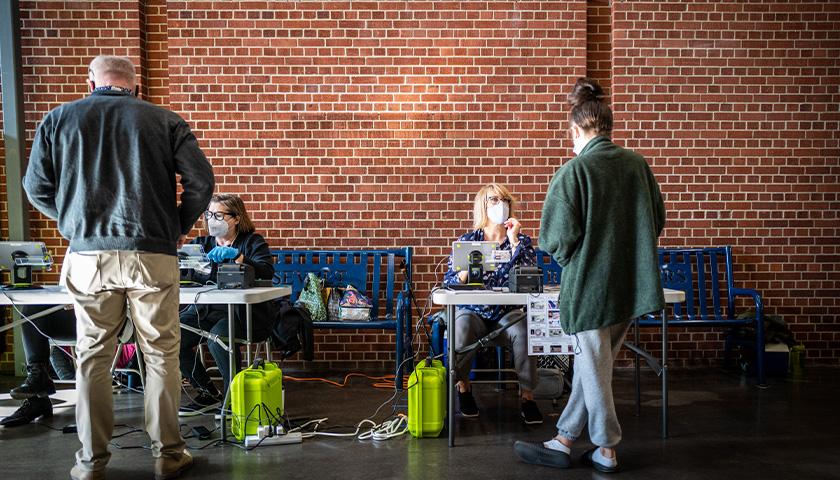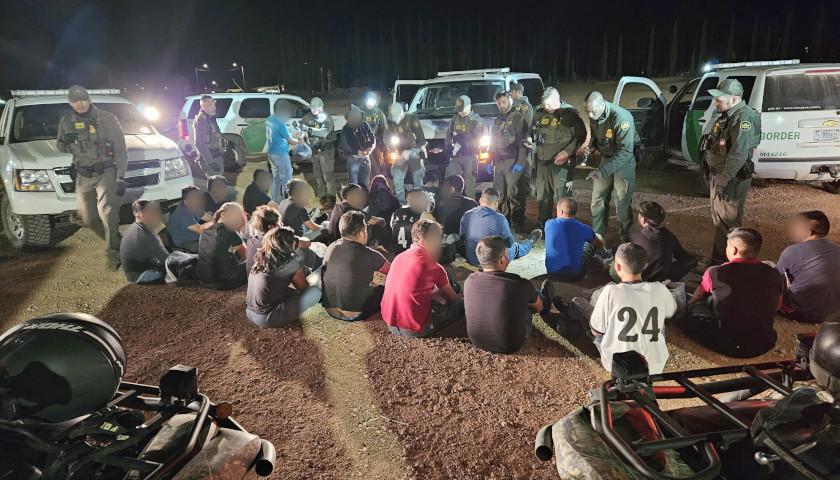The Tennessee Supreme Court heard arguments Thursday concerning the citizens’ right to vote via absentee ballot.
The cases presented (Earle J. Fisher et al. v. Tre Hargett et al. and Benjamin Lay et al. v. Mark Goins et al.) have become the focal point of the ongoing debate surrounding the efficacy of absentee and mail-in ballots and voters’ rights to absentee and mail-in ballots during the COVID-19 pandemic.
The hearings come as the result of the state of Tennessee’s appeal of a ruling made by a lower court that expanded the option of absentee ballots to all Tennesseans, regardless of health.
In summary, the State of Tennessee’s main arguments (as delivered by Janet Kleinfelter) centered around defining absentee ballots as a privilege rather than an inherent right.
Kleinfelter made clear that current voting statutes view absentee ballots as an alternative method of voting that should be reserved for a select few individuals, including those that have either tested positive for COVID-19 or have been in contact with someone that has tested positive for COVID-19. However, absentee ballots should not be extended to all Tennesseans; the State’s main argument declared that fear of COVID-19 did not qualify a voter for an absentee ballot.
The plaintiffs in the case, represented by Steven Mulroy and Angela Liu, believed that the current qualifications for an absentee ballot not only put voters’ health at risk but also violated their constitutional right to vote.
Mulroy argued that the current statutes concerning voting forced voters to choose between “their franchise and their health.” Referencing other states that have broadened the requirements for absentee voting, Mulroy also argued that the state of Tennessee did not have an inordinate burden placed upon it to expand absentee voting.
Liu echoed these points in her arguments, saying that denying absentee ballots to the plaintiffs and, by extension, most Tennesseans directly attacked their constitutional right to safely vote. Liu likened in-person voting during the pandemic to a polling location catching fire; while it may be detrimental to a voter’s health to vote in such a situation, the state of Tennessee could effectively saying it technically hadn’t denied the right to vote.
The Supreme Court will take the arguments and evidence of the case under consideration and will render its verdict after deliberating.
Details of Thursday’s hearings follow below.
Speaking for the State, Janet Kleinfelter opened her arguments by referencing Tennessee’s state voting laws. Tennessee allows voters to cast their ballot via mail if they are “hospitalized, ill, or disabled.” Kleinfelter stated that the definitions of the terms “hospitalized” and “disabled” were not at question, as they are clearly understood. Kleinfelter instead made the term “ill” the main crux of the state’s arguments.
Kleinfelter stated the “plain, ordinary meaning” of the word “ill” refers to an individual directly suffering from a sickness or otherwise being “not in good health.”
Justice Cornelia Clark asked Kleinfelter if citizens applying for an absentee ballot due to illness had to specify their malady. Kleinfelter said they did not; there is only a checkbox to indicate the reason for application as an illness.
Justice Sharon Lee then asked Kleinfelter how she would define “ill.” Kleinfelter responded that being ill does not include fear of exposure to disease. She further elaborated that the State had expanded the definition of illness to include testing positive for COVID-19 or exposure to someone who had tested positive for COVID-19.
When asked by Justice Lee whether or not asymptomatic COVID-19 carriers were considered ill (which she called “silent spreaders), Kleinfelter stated they were. The Deputy Attorney General further said that it was up to individual voters to determine whether or not they should be considered ill, leaning on the fact that asymptomatic people are still out in public.
When pressed on this point, Kleinfelter responded that there was “no way for the state to completely eliminate the risk, and the law doesn’t require the state to completely eliminate the risk.”
Justice Holly Kirby inquired as to those that have underlying conditions that may increase their risk of contracting COVID-19 or increase the detrimental effects of the disease. Kleinfelter stated that if an individual voter can determine whether or not they are ill when applying for an absentee ballot, presuming they meet all other requirements for the ballot.
Justice Roger Page asked if this determination was on “the honor system” and whether or not these claims were checked or would be checked in the future. Kleinfelter said that the statements would only be verified in the event of an election contest and at the request of a candidate.
Chief Justice Jeffery Bivins asked if the voter in question’s medical condition would be disclosed in such an instance. Kleinfelter said it would not.
Justice Lee asked Kleinfelter as to how voters would know they could apply for an absentee ballot in the case that they had an underlying condition that might increase their risks. Kleinfelter stated that the current injunction, filed on June 4, forced the State to alter the application and instructions for absentee ballots. She also stated that election officials were instructed to grant absentee ballots under these conditions as well.
Kleinfelter pointed out that the injunction allowed anyone who feared contracting COVID-19 to apply for an absentee ballot and that this allowance did not have an expiration. According to Kleinfelter, the plain language of the lower court’s ruling applies indefinitely.
Kleinfelter closed her starting time by pointing out that the statutes concerning absentee ballots convey a privilege rather than a right, driving home the State’s argument that the lower court’s decision is essentially a policy change expanding absentee voting from a privilege extended to some to a right reserved for all.
Representing the first group of plaintiffs, Attorney Steve Mulroy opened by asking whether or not the right to vote included the right to “vote safely.” Mulroy also asked whether or not the state of Tennessee had the right to “force voters to choose between their franchise and their health.”
Mulroy finished his opening by stating that it was “factual record” that COVID-19 presented a significant health risk to voters and that since other states allowed more voters the option of absentee ballots, Tennessee did not face a burden by affording its citizens the same option.
Justice Clark asked Mulroy as to how other states had enacted these policies, specifically asking if their courts had issued rulings that changed policy. Mulroy clarified that other states had broadened absentee voting through the action of either the Executive or Legislative branches, not the Judiciary.
Chief Justice Bivins followed up on this point by stating the plaintiffs were asking the Tennessee State Supreme Court to be the only court in the nation to hold that absentee voting was a constitutional right.
Mulroy denied this, stating that the plaintiffs claimed the State’s policy of forced in-person voting was a “violation” of the Tennessee Constitution expressly and generally guaranteeing a right to vote.
When questioned by the judges about the lack of in-person testimony and assessment of witness demeanor and credibility, Mulroy said this point was a non-issue. Instead, he stated the lower courts did a “careful job” examining the affidavits submitted to the court.
Justice Kirby asked about the practical application of absentee voting. Referring to a similar situation in Wisconsin and citing state evidence pointing to difficulties in increased numbers of absentee ballots, Justice Kirby expressed concern for a “tsunami of mail-in ballot applications.”
Mulroy pointed out that the State has said it would be prepared to process up to 1.4 million absentee ballots, primarily for those aged 60 and older (which represents 36% of registered voters). Mulroy also said the State has known since June 4 (the date of the lower court’s ruling) that it would need to accommodate more absentee ballots.
Chief Justice Bivins asked if medical experts had reviewed Tennessee’s plans for in-person voting. Mulroy said the experts attached to his case had reviewed the plan and that they found it “inadequate” to remove medical risk.
Justice Lee asked Mulroy how his clients fit into the definition of “ill” offered by the State. After responding that the State had changed its position, Lee pressed the question.
Mulroy answered by saying that the State’s definition included those who tested positive for COVID-19, even though they could still physically appear at a polling place. Mulroy also claimed the statute should extend to all voters with underlying medical conditions as the language in part of the statute applies to voters that cannot appear because of “sickness, hospitalization, or disability.”
Justice Kirby refuted this claim, saying the language referred to the permanent absentee register, which was outside the scope of the case. She pointed out that the issue at hand did not apply to this part of the statute.
Mulroy finished his time by stating the “unrebutted medical testimony” presented in the case showed that there was a “moderate medical burned to all voters.”
Speaking for the next group of plaintiffs, Attorney Angela Liu of Dechert LLP opened by arguing the case concerned Tennesseans’ “fundamental right to vote” that “shall never be denied to any person entitled thereto.” Liu claimed that the requirement to vote in-person would force voters to “risk their health and perhaps their lives to exercise this most important right.”
Justice Clark asked Liu for her interpretation of the length of the injunction, specifically asking if it was indefinite. Liu said she believed the injunction was meant last “as long as [Tennessee] remains in a state of emergency until there’s a consensus among public health officials that [it’s] not.”
Referring to Liu’s opening claims that the State’s policy restricted constitutional rights, Chief Justice Bivins said that both the Tennessee Supreme Court and numerous other state and federal courts had differentiated between a citizen’s right to vote and absentee voting, calling absentee ballots a “privilege.”
Liu said the case didn’t concern the right to vote absentee, but the right to vote. Likening voting during the pandemic to the tornadoes that hit Tennessee during Super Tuesday (March 3, 2020), Liu claimed the State’s “rational basis” for requiring in-person voting forced some voters into danger.
Justice Kirby echoed questions about the State’s ability to “gear up” for increased absentee voting. Liu responded by claiming the lower court found the chance for 100% of ballots to be mailed was unlikely.
Kirby retorted that the response didn’t answer her question, instead stating that there was “no question” the injunction put a burden on the State to revamp its voting system.
Liu pointed out that the State had already “geared up from 3% to 36% very quickly.” She also pointed to the numerous other states in the country that had made policy changes to expand absentee voting.
Liu continued, saying that the State’s decision was similar to a polling place being “on fire.” In her metaphor, Liu claimed that even though voters may or may not suffer from smoke inhalation, they couldn’t say the State impeded their right to vote.
Liu closed her arguments by saying that as the pandemic grows worse, her plaintiffs were “talking about protecting people’s lives.”
Having reserved some of her time, Kleinfelter offered some rebuttals. Attacking Liu’s last point, Kleinfelter said that the court needed to look at the entire statutory scheme.
Kleinfelter pointed to early voting as an alternate method, saying that the State offered “15 days of early voting at multiple places” and times. Kleinfelter continued, saying that the State has done nothing so far to impede voters.
Kleinfelter also referenced precedent, reminding the Court that it “never held” that citizens have a right to absentee voting.
Kleinfelter stated that no other state’s court system had ordered the expansion of absentee voting. Referencing a court decision in Texas, Kleinfelter said disability “does not include the fear of contracting COVID-19.”
Kleinfelter finished her time by stating that, in order to protect the freedom of elections and the “purity of the ballot box,” the Tennessee Legislator had not yet opened absentee voting to everyone. Instead, the lower court’s decision had “conferred that privilege to everyone.”
You can listen to the full audio of Thursday’s hearing here.
– – –
Sam Medley is a journalist at the Tennessee Star and Star News Network. You can follow Sam at Twitter. Email tips to [email protected].
Photo “Tennessee Supreme Court Hearing” by TN Courts.









Janet Kleinfelter opened her arguments by referencing Tennessee’s state voting laws. Tennessee allows voters to cast their ballot via mail if they are “hospitalized, ill, or disabled.”
And as I understand it, Democrats have re-defined the word “disabled” to be used as another word for death.
If you can somehow get your beer and cigarettes while flashing a state ID at the convenience store, then you can get off your arse and go vote.